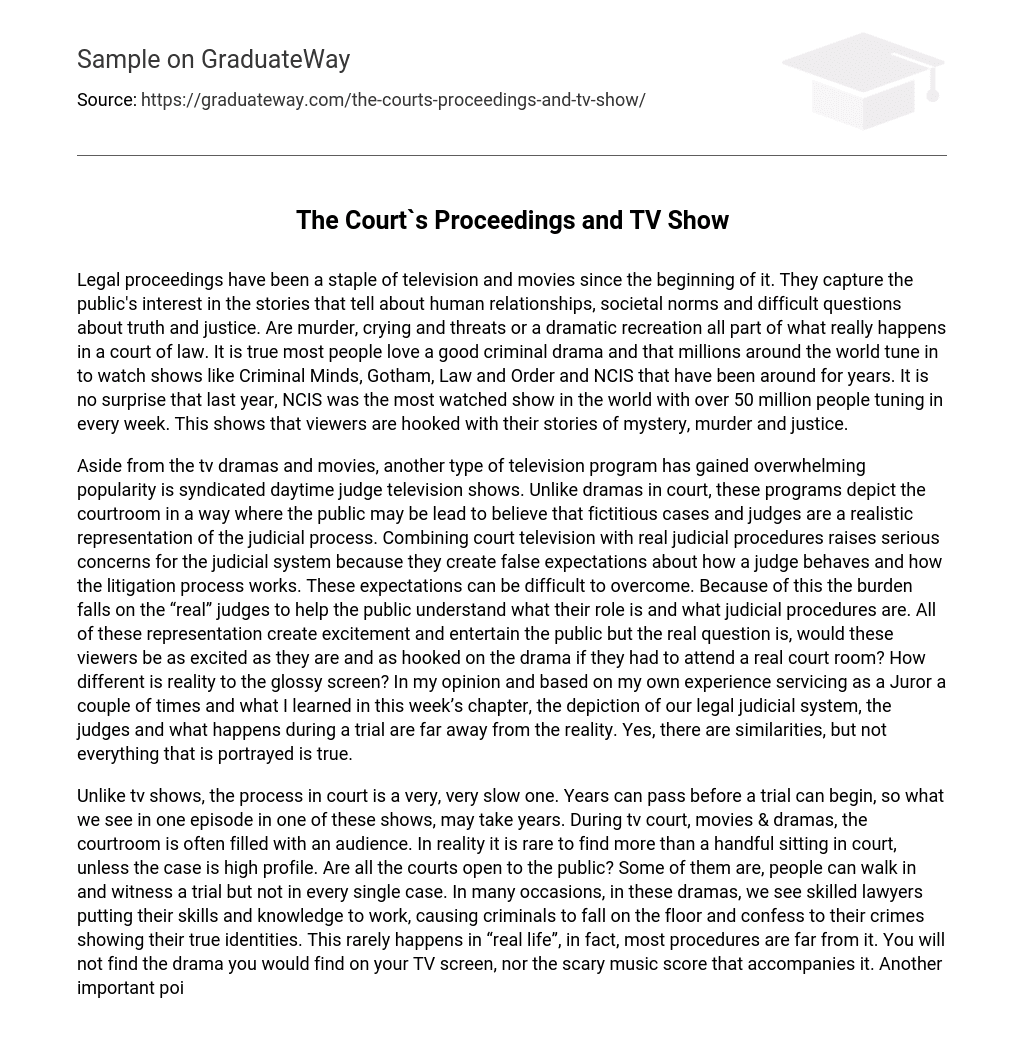Legal proceedings have been a staple of television and movies since the beginning of it. They capture the public’s interest in the stories that tell about human relationships, societal norms and difficult questions about truth and justice. Are murder, crying and threats or a dramatic recreation all part of what really happens in a court of law. It is true most people love a good criminal drama and that millions around the world tune in to watch shows like Criminal Minds, Gotham, Law and Order and NCIS that have been around for years. It is no surprise that last year, NCIS was the most watched show in the world with over 50 million people tuning in every week. This shows that viewers are hooked with their stories of mystery, murder and justice.
Aside from the tv dramas and movies, another type of television program has gained overwhelming popularity is syndicated daytime judge television shows. Unlike dramas in court, these programs depict the courtroom in a way where the public may be lead to believe that fictitious cases and judges are a realistic representation of the judicial process. Combining court television with real judicial procedures raises serious concerns for the judicial system because they create false expectations about how a judge behaves and how the litigation process works. These expectations can be difficult to overcome. Because of this the burden falls on the “real” judges to help the public understand what their role is and what judicial procedures are. All of these representation create excitement and entertain the public but the real question is, would these viewers be as excited as they are and as hooked on the drama if they had to attend a real court room? How different is reality to the glossy screen? In my opinion and based on my own experience servicing as a Juror a couple of times and what I learned in this week’s chapter, the depiction of our legal judicial system, the judges and what happens during a trial are far away from the reality. Yes, there are similarities, but not everything that is portrayed is true.
Unlike tv shows, the process in court is a very, very slow one. Years can pass before a trial can begin, so what we see in one episode in one of these shows, may take years. During tv court, movies & dramas, the courtroom is often filled with an audience. In reality it is rare to find more than a handful sitting in court, unless the case is high profile. Are all the courts open to the public? Some of them are, people can walk in and witness a trial but not in every single case. In many occasions, in these dramas, we see skilled lawyers putting their skills and knowledge to work, causing criminals to fall on the floor and confess to their crimes showing their true identities. This rarely happens in “real life”, in fact, most procedures are far from it. You will not find the drama you would find on your TV screen, nor the scary music score that accompanies it. Another important point is that nothing can prepare you in dealing with the victims. It is one thing to see how the drama unfolds on television, but it is another thing when you face a victim or the victim’s family. It is easy to disassociate yourself when you are an witnessing this through a glossy box from the comfort of your home, but it is another thing to live the pain of the loss of the truth.
In shows like Law and Order and NCIS, the testimony of the experts seems quite quick and succinct. In “real life, these testimonies are long, prolonged and, sometimes, the information is overwhelming with information. DNA testimony is a prime examples of this, it is very complicated to understand unless you are an expert. Each question, although sometimes obvious, is concise with little room for error, and sometimes, you just want it to end. In “real life”, the jury does not hear about all of the evidence in a the courtroom. They are often escorted out of the courtroom while both legal teams are left to discuss important information with the judge. The jury can only listen to official registered information. Also, often, on television, the defendants take the stand to try to defend themselves against a guilty verdict, but in reality, it is not common for the accused to testify.
It is extremely important to mention that in “real life”, most law enforcement officers, investigators and forensic specialists receive little to no formal training on techniques in providing testimony in front of a judge or jury. In the “fake courtroom” jury members assume that because of your job, you are properly trained in providing testimony and do it on a regular basis because of this. So on tv, they are depicted as specialists in their field and sometimes their testimony is the only thing needed to convict a criminal. The truth is that for most criminal justice witnesses, testifying in court is not part of their job description nor part of their schedules.





